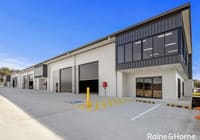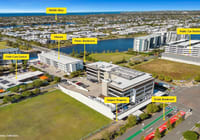
‘It’s a landlord’s market’
With median house prices above $1 million in parts of Sydney, Canberra and Melbourne, it’s easy for smaller investors to feel squeezed out of the residential market. However, the industrial market still offers lots of options, especially properties on a strata title.
Strata titles apply on industrial estates where properties share common land or infrastructure; maybe building exteriors, driveway or a car park. All the landowners contribute to the maintenance of the shared portion, which usually means employing a building manager. Strata titles also often apply to commercial properties, such as serviced apartments, shops and offices.
“Strata properties are usually cheaper [to buy] and tend to yield a higher return on investment,” says Colliers associate director Andrew Chrapot.
“Generally strata is easier to lease – there is more of a market for them,” he says. On the downside, tenant turnover can be higher. “They offer entry-level pricing for a lot of new businesses, and naturally some businesses fail.”
While land tax may be lower – due to smaller block sizes – ongoing maintenance costs must be factored in.
“Body corporate [owners’ corporation] fees are the number one thing to be aware of,” Chrapot adds. “You want to make sure there’s a really strong body corporate, because you don’t want the broader complex to be run poorly.”
To get an idea of a fair rate, Chrapot advises speaking to other owners and comparing fees with similar parks and developments.
Murray Pettinger, director of industrial sales and leasing at JLL, agrees, saying investors should get a strata report and check repairs have been done properly and the building has been maintained to standard.
“Check the sinking fund can cover any future issues,” he says. “And when you get a building inspection, check future issues across the whole estate, because a leaking roof next door might trigger the whole allotment to be updated.”
There may also be strata by-laws that affect you or dictate how the property is used.
Despite strata being cheaper to buy than freehold, Murray says that, with shared costs, the returns are about the same.
“But generally strata is lower risk – or the risk is shared across all owners,” he adds.
“Strata premises generally have better security too and, because the maintenance is taken care of, they are a good introduction for new owners – a good learning place – and a relatively safe investment for future growth.”
Responses to COVID-19 supply-chain challenges have seen a surge in demand for warehousing and manufacturing space, affecting other types of industrial real estate.
“Vacancy rates are now at an all-time low in the industrial area, putting pressure on prices and rents,” Petting says. “It’s a landlord’s market, so they can choose who they have going into their property.”










